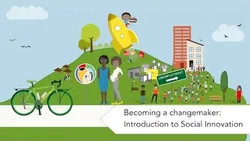
Becoming a changemaker: Introduction to Social Innovation 
This 6 week course provides an introduction to social innovation, empowering individuals to become changemakers and make a positive impact in their communities. Participants will gain the skills and knowledge to create meaningful change. ▼
ADVERTISEMENT
Course Feature
![]() Cost:
Cost:
Free
![]() Provider:
Provider:
Coursera
![]() Certificate:
Certificate:
No Information
![]() Language:
Language:
English
![]() Start Date:
Start Date:
Self Paced
Course Overview
❗The content presented here is sourced directly from Coursera platform. For comprehensive course details, including enrollment information, simply click on the 'Go to class' link on our website.
Updated in [March 06th, 2023]
Becoming a changemaker: Introduction to Social Innovation
What is Social Innovation?
Simple, complicated and complex
Wicked problems
The 5 Whys
Case study: Mothers2mothers
Reflecting with RLabs: problems
(Please note that we obtained the following content based on information that users may want to know, such as skills, applicable scenarios, future development, etc., combined with AI tools, and have been manually reviewed)
This course provides an introduction to the concept of social innovation and how it can be used to create positive change in the world. It begins by exploring the definition of social innovation and how it differs from traditional approaches to problem-solving. It then examines the different types of problems that can be addressed through social innovation, including simple, complicated, and complex problems. The course then introduces the concept of "wicked problems" and how they can be addressed through social innovation. It then looks at the "5 Whys" approach to problem-solving and how it can be used to identify the root cause of a problem. The course then looks at a case study of the organization Mothers2mothers and how they have used social innovation to address the problem of HIV/AIDS in Africa. Finally, the course looks at the Reflecting with RLabs approach to problem-solving and how it can be used to identify and address problems in a community. By the end of the course, students will have a better understanding of social innovation and how it can be used to create positive change in the world.
[Applications]
After completing this course, participants are encouraged to apply the concepts of social innovation to their own lives and communities. They can use the 5 Whys technique to identify the root causes of a problem and develop creative solutions. They can also use the case study of Mothers2mothers to explore how a successful social innovation project was implemented. Finally, they can use the Reflecting with RLabs exercise to identify and analyze problems in their own communities.
[Career Paths]
1. Social Innovation Consultant: Social Innovation Consultants help organizations identify and develop innovative solutions to social problems. They use their knowledge of the latest trends and technologies to develop strategies that can be implemented to create positive change. As the demand for social innovation increases, the need for experienced consultants is also growing.
2. Social Entrepreneur: Social entrepreneurs are individuals who use their business acumen to create solutions to social problems. They use their skills to develop innovative products and services that can be used to address social issues. As the demand for social entrepreneurs increases, the need for individuals with the right skills and knowledge is also growing.
3. Social Impact Analyst: Social Impact Analysts are responsible for assessing the impact of social initiatives on the environment, society, and economy. They use their knowledge of data analysis and research to identify and measure the impact of social initiatives. As the demand for social impact analysis increases, the need for experienced analysts is also growing.
4. Social Media Manager: Social Media Managers are responsible for managing the social media presence of organizations. They use their knowledge of the latest trends and technologies to create content that engages and informs audiences. As the demand for social media management increases, the need for experienced managers is also growing.
[Education Paths]
1. Bachelor of Social Innovation: This degree path focuses on the development of innovative solutions to social problems. It covers topics such as social entrepreneurship, social impact assessment, and social policy. Students learn to identify and analyze social issues, develop strategies to address them, and evaluate the effectiveness of their solutions. This degree is becoming increasingly popular as more organizations recognize the need for creative solutions to complex social problems.
2. Master of Social Work: This degree path focuses on the development of skills and knowledge related to social work. It covers topics such as social justice, human rights, and social welfare. Students learn to identify and analyze social issues, develop strategies to address them, and evaluate the effectiveness of their solutions. This degree is becoming increasingly popular as more organizations recognize the need for professionals with the skills to address social issues.
3. Master of Public Policy: This degree path focuses on the development of skills and knowledge related to public policy. It covers topics such as policy analysis, public administration, and public finance. Students learn to identify and analyze public policy issues, develop strategies to address them, and evaluate the effectiveness of their solutions. This degree is becoming increasingly popular as more organizations recognize the need for professionals with the skills to address public policy issues.
4. Master of Social Entrepreneurship: This degree path focuses on the development of skills and knowledge related to social entrepreneurship. It covers topics such as business planning, financial management, and social impact assessment. Students learn to identify and analyze social issues, develop strategies to address them, and evaluate the effectiveness of their solutions. This degree is becoming increasingly popular as more organizations recognize the need for professionals with the skills to create and manage social enterprises.
Course Syllabus
Discovering resources
Appreciative inquiry
Case study: The Street Store
Finding hidden resources
Reflecting with RLabs: resources
Pros & Cons

1. Excellent content and valuable tools for starting social projects.

2. Inspiring and motivating course that encourages action and change.

3. Provides a comprehensive introduction to social entrepreneurship and innovation.

4. High-quality videos and practical examples enhance the learning experience.

5. Suitable for professionals looking to enhance their skill set.

1. Flawed student-based marking system for assignments.

2. Some learners may find the course more beneficial at an earlier stage.

3. Limited depth in measuring impact and scaling social innovation.

4. Difficulty in obtaining sufficient peer feedback for the final assignment.

5. Challenges in addressing interconnected structural problems effectively.
Course Provider

Provider Coursera's Stats at AZClass
Discussion and Reviews
0.0 (Based on 0 reviews)
Explore Similar Online Courses

Data Science A-Z: Real-Life Data Science Exercises Included

ANGULAR - BEYOND FUNDAMENTALS

Python for Informatics: Exploring Information

Social Network Analysis

Introduction to Systematic Review and Meta-Analysis

The Analytics Edge

DCO042 - Python For Informatics

Causal Diagrams: Draw Your Assumptions Before Your Conclusions

Whole genome sequencing of bacterial genomes - tools and applications

Amazon FBA Product Launch - Giveaway and PPC Campaigns

Launch Strategy: 5 Steps to Capstone Experience

Legal Tech & Startups
 Related Categories
Related Categories
 Popular Providers
Popular Providers
Quiz
 Submitted Sucessfully
Submitted Sucessfully
1. What is the 5 Whys?
2. What is the purpose of the case study Mothers2mothers?
3. What is the purpose of Reflecting with RLabs?


Start your review of Becoming a changemaker: Introduction to Social Innovation